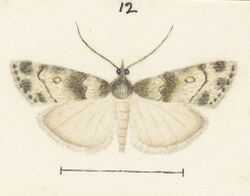Biology:Eudonia meliturga
| Eudonia meliturga | |
|---|---|

| |
| Scientific classification | |
| Kingdom: | |
| Phylum: | |
| Class: | |
| Order: | |
| Family: | |
| Genus: | |
| Species: | E. meliturga
|
| Binomial name | |
| Eudonia meliturga (Meyrick, 1905)[1]
| |
| Synonyms[2] | |
| |
Eudonia meliturga is a moth in the family Crambidae.[3] It was described by Edward Meyrick in 1905.[4][2] This species is endemic to New Zealand.[1][5]
The wingspan is 17–19 mm. The forewings are ochreous-whitish, suffused with pale ochreous-yellowish in the disc and sprinkled with dark fuscous. The first line is ochreous-white, edged posteriorly with dark fuscous suffusion. The second line is ochreous-white, edged anteriorly with dark fuscous. The terminal area is irrorated with dark fuscous and there is an ochreous-whitish subterminal line, as well as an interrupted ochreous-white terminal line. The hindwings are pale whitish-grey, suffused with grey posteriorly. Adults have been recorded on wing in December and January.[4]
References
- ↑ 1.0 1.1 "Eudonia meliturga (Meyrick, 1905)". Landcare Research New Zealand Ltd. http://www.nzor.org.nz/names/bde198c1-a36c-4425-b96c-dc250d8eda6b. Retrieved 26 January 2018.
- ↑ 2.0 2.1 Dugdale, J. S. (1988). "Lepidoptera - annotated catalogue, and keys to family-group taxa". Fauna of New Zealand 14: 157. https://www.landcareresearch.co.nz/__data/assets/pdf_file/0017/26324/FNZ14Dugdale1988.pdf. Retrieved 26 January 2018.
- ↑ , p. 458, Wikidata Q45922947
- ↑ 4.0 4.1 Meyrick, E. (1905-07-01). "Notes on New Zealand Lepidoptera." (in en). Transactions of the Royal Entomological Society of London 53 (2): 219–244. doi:10.1111/j.1365-2311.1905.tb02451.x. ISSN 1365-2311. https://biodiversitylibrary.org/page/14788048.
 This article incorporates text from this source, which is in the public domain.
This article incorporates text from this source, which is in the public domain.
- ↑ "GlobIZ search". http://globiz.pyraloidea.org/Pages/Reports/TaxonReport.aspx. Retrieved 2014-07-15.
Wikidata ☰ Q13618311 entry

